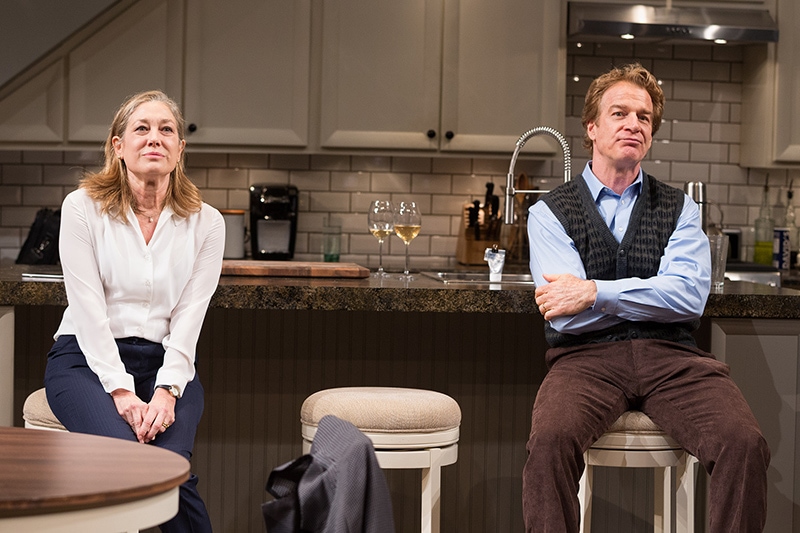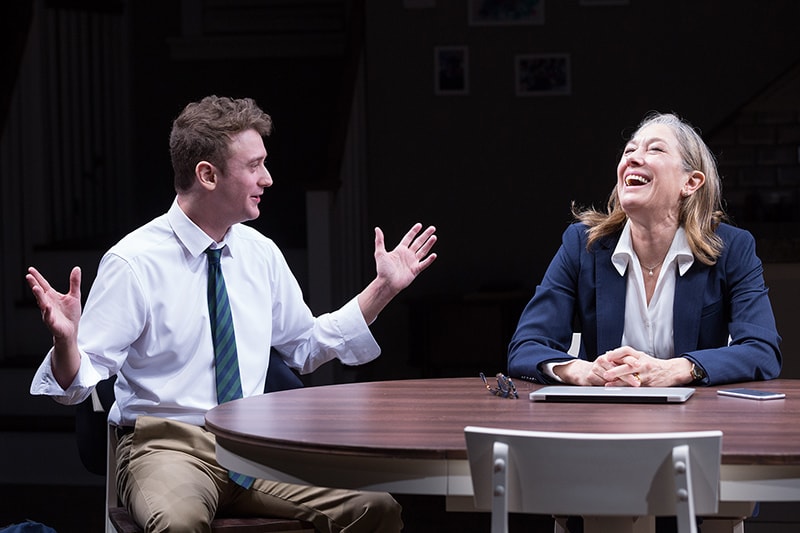It’s an odd thing, as a Latina here in Washington, D.C., to observe the mental wrestlings of liberal white folks struggling to come to terms with their privilege. How in muted voices they make sure to swat it down or diminish the scope as if white privilege were something undesirable and démodé. Admissions, the new play by Joshua Harman (Bad Jews), takes precisely this demographic of upper-middle-class white people as its target. Part comic exercise in self-mockery and part intimate community drama, director Mike Donahue orchestrates an emotional tour-de-force about the often rotten core at the heart of efforts to be a white ally.

Sherri Mason (Meg Gibson) is the head of admissions at Hillcrest, a prestigious boarding school in New Hampshire. Her husband, Bill (Kevin Kilner), serves as dean and her seventeen-year-old son, Charlie (Ephraim Birney), enjoys free tuition thanks to his parents’ roles in the administration. From the get-go, we learn that Sherri dedicates her life work at Hillcrest to increasing the percentage of diverse students in attendance, and this year the desired marker is twenty percent. An opening tête-à-tête with the much older administrative hand, Roberta (Sarah Marshall), shows that Sherri takes her commitment to portray Hillcrest as a friendly place for people of color quite seriously.
The new admissions catalog, it turns out, hardly includes any pictures of Hillcrest’s non-white students – though it does, Roberta points out, include a picture of Charlie’s best friend, Perry Peters. The son of a white mother and black father, Perry isn’t identifiably black enough according to Sherri, who then sends Roberta out to re-do the catalog with pictures of more black or Hispanic students. This relatively light spat opens up one of the play’s many thematic tightropes: how do white people make sense of and honestly see people of color and their place within institutions?
The thread offered by this question is vigorously pulled and unravels the Mason family when Charlie gets deferred entry to Yale, while Perry (who never appears in person) receives that desired acceptance email instead. In an impressively long temper tantrum with overtones of bitter MAGA racism, young Charlie lashes out against preferential treatment and the snubbed opportunities he’s experienced for the sake of making room at the table for a woman or black person.
In this un-interrupted monologue, it’s hard to watch Birney, but it’s impossible to look away. Spittle flying, deep red in the face – however brilliant of a student he may be, Charlie proves to be as entitled as you’d expect, denouncing the culture of diversity that rewards “mediocre” work by minorities to stick it to the white guy, the new public enemy #1.
There’s a running joke in Admissions, in which Ginni (Marni Penning) makes recurring appearances with cake, and then cookies from “Martin’s Bakery,” a business run by an accused child molester. “But they’re the best in town,” is Ginny’s reasoning. No one can help that. Despite some half-baked demurring, everyone’s willing to take a bite and enjoy the treats, regardless of their ethical positions on the titular Martin. This bit curiously critiques the attitudes at large – when you’ve got something desirable, at what point, if any, should it be disavowed when it conflicts with your beliefs about how the world should be?
Gibson’s Sherri is the focal point of the narrative, with the most dialogue and stage-time. Harman, for better or for worse, is primarily interested in this character’s hypocrisy as an enlightened admissions counselor that seemingly goes against her convictions when she defends her own son’s exceptional standing and validates his sense of entitlement. Gibson plays her helicopter mom character with pomp and psychosis, and hers is a convincing, slightly villainous performance.

But I couldn’t help but feel that the play did not belong to her, however much Sherri is the center of the conflict. A greater ensemble approach in the script would’ve ironed out some of the more nuanced questions posed by Bill, Charlie, and Ginny. What’s more, the twist at the end elicits reactions from Sherri and Bill that dull the impact of their son’s vitriol, apparently forcing them to question their priorities in life, though the answer feels disappointingly ready-made.
I’m not sure that Admissions is as politically useful of an artwork as it wants to be; it doesn’t gesture towards a solution or even entertain the hope of change, so much as wallow in the muck of how difficult of a position it is to be a privileged white person in a world that now sees color. What it does get right, however, is its depiction of just how elusive, how mired with martyrdom and self-interest and dead ends that merely being “not racist” can be for so many. Though there were some line delivery stumbles in the premiere performance, I left thoroughly impressed by the cast, who elevated this hopeless 1 percent sliver of life into a work of heated dramatic appeal.
[Read John Stoltenberg’s Magic Time! column on Admissions.]
Running Time: One hour and fifty minutes, with no intermission.
Admissions plays through March 24, 2019, at Studio Theatre – 1501 14th Street NW,
in Washington, DC. For tickets, visit the box office or purchase them online.
Lighting Design by Amith Chandrashaker; Scenic Design by Caite Hevner; Costume Design by Kathleen Geldard.




